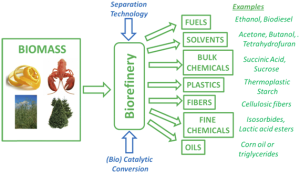Over the next years, global population growth is expected to push the population of the world up to a total of 9 billion people in 2050. Such an increase, along with the rapid depletion of many resources, external energy dependence compounded by price instability, increasing pressures on the environment, as well as climate change, are all factors that make it necessary for Europe to make radical changes in how it produces, consumes, processes, stores, recycles and uses biological resources.
The European Commission has adopted a strategy designed to move the economy towards a more sustainable use of resources, intended to satisfy the needs of a broad range of industrial sectors, promote synergies and complement other areas policy areas, such as energy and climate change. The strategy outlines key objectives including a cut in greenhouse gases of at least 20% compared with 1990 levels, increasing energy efficiency by 20% and covering 20% of the total energy consumption in the European Union using renewable energy sources.Exploiting the very significant quantities of currently underused biomass resources presents an opportunity to advance along the path marked out by the bioeconomy policies of the European Union.
Innovation in Biorefinery

The main objective of the VALORPLUS project is the development of integrated closed loop biorefineries that ensure their sustainability and economical viability through a complete use of biomass, minimise waste, and generate the greatest possible added value from the available resources. To this end, the ongoing research and development carried out in the course of the project is aimed at developing quality control procedures for the reliable and consistent recuperation, treatment and revalorisation of hemicellulose fibres, minimally degraded lignin macromolecules and raw crude glycerol compounds. The applications of these processes are very diverse, as they can be used to create a wide range of subproducts with potential uses across a variety of applications, ranging from biofuels to the manufacture of prebiotics, bioplastics, biomaterials and coatings.
The new biorefinery concept which provides the framework of this project marks a clear step forward in that it overcomes problems arising from the generation of residues by giving them new value. This is how a significant increase in profitability and competitiveness over petrochemical equivalents will be achieved – due to a greater efficiency derived from generating multiproducts; a reduction in dependency on food crops by using a broader range of biomass resources (agricultural and forestry residues); and also by creating value in something which initially lacked any such value.
The European Valor Plus consortium that will participate in the development of these sustainable integrated biorefineries is made up of 14 members, including six SMEs, one large company, four research centres and three universities: The UK Health & Environment Research Institute (UK), Brunel University (UK), Politecnico Di Milano (IT), TechnischeUniversitaetMuenchen (DE), BiobasicEnvironnementSarl (FR), Fraunhofer-Gesellschaft zur Foerderung der AngewandtenForschung E.V. (DE), Beta Renowable Group SL (SP), Instituto Tecnológico de Embalaje, Transporte y Logística (SP), Fundación Cartif (SP), WissenschaftlicheGerätebau Dr. Ing. Herbert Knauer GmbH (DE), Abengoa Research SL (SP), ASEBIO Asociación Española de Bioempresas (SP), VogelbuschBiocommoditiesGmbh (AT), Asa Spezialenzyme GMBH (DE).
Challenges in Biomass Conversion
Efficient use of biomass, however, is not quite that simple because recalcitrant behaviour hinders sometimes their biological conversion. Hence the need for pre-treatment and transformation as is being developed in this project, to overcome resistant properties and convert these resources into the desired products in the most efficient way. So cellulose, hemicellulose and glycerol are turned into sugars or other compounds (organic acids and lipids) which can be biologically converted into biofuels and high value added chemical products(prebiotic, additives for polymer composites, adhesives and coatings, fuel additives and other chemicals of interest such as ethanol, butanol, 1,3-PDO, etc.).
Positive economic impact on the Bio Sector
The project will have an important impact on the assimilation of the newly developed technologies. The impacts can be summed up as follows: decreasing the dependency on oil and fossil based products; the adoption of more sustainable practices in the agricultural economies; improving biodiversity through the new varieties of lignocellulose crops; tailored solutions for industries which produce new bio-based products; rural development; and the development of other industries due to the links and overlaps between companies, products and services.
Text by : Pilar Caro Chinchilla, Projects Dpt.,Technical Support Officer,project VALORPLUS
For more details, please visit : www.valorplus.es


